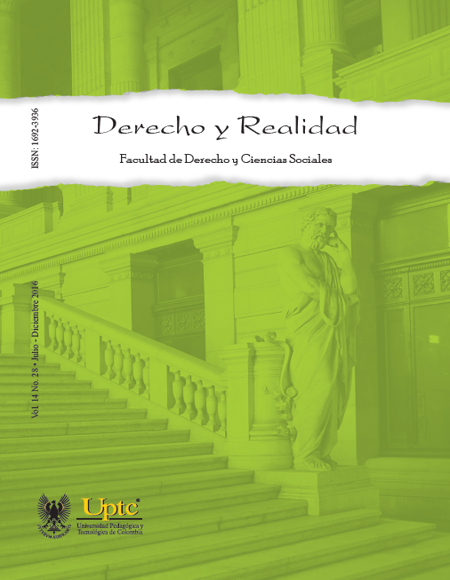Political violence, democracy and human rights

Abstract
Colombia has been characterized through its political history to be bipartisan; the desire of power has bled the country long ago, and contentions have shown the inequality and social injustice. The Governing body forgets the spirit behind representative democracy, bringing humanity to this minimum expression and
ignoring human rights. The Government seems to be the most repressive of any kind of movement arising within a society to make its own demands, awakening consciences and calling for a change in favor of the disadvantaged majority. The State is no longer conceived as a democratic apparatus and acquires the
connotation of political apparatus, used to manipulate and exclude with the arrangement of a few holders of power which is legitimated only through a day of voting that does not reflect the popular desire, but the maneuvers that can achieve the inequitable distribution of wealth.
Keywords
Democracy, human rights, inequality, political violence
References
Centro Nacional de Memoria Histórica -CNMH–UARIV-. (2015). Una nación desplazada; informe nacional del desplazamiento forzado en Colombia. Bogotá: CNMH.
Defensoría del Pueblo. (2004). Desplazamiento forzado en Colombia. Bogotá: Red Nacional de Promotores de Derechos Humanos.
Gallego, C. (2015). Notas para una propuesta de periodización de la historia del conflicto colombiano en el siglo XX. Tunja: Maestría en Derechos Humanos
UPTC.
Guzmán, G., Fals, O. & Umaña, E. (1962). La violencia en Colombia. Tomo 1. (2 ed.). Bogotá: Tercer Mundo.
Herrera, J. (2003). Los derechos humanos en el contexto de la globalización: tres precisiones conceptuales. En Coloquio Internacional Direito e Justica no Século XXI. Coimbra.
Laclau, E. (s.f.). La democracia y el problema del poder. Recuperado de https:// sociologia1unpsjb.files.wordpress.com/2008/08/09-laclau-democracia.pdf
López, J. (2013). Los derechos Humanos en movimiento: Una revisión teórica contemporánea. Teoría y Debate, 26(56), 9–37.
Restrepo, M. (2010). Economía y derechos humanos: del liberalismo al neoliberalismo. Tunja: UPTC, Colección Investigación UPTC n.º 31.
Sarmiento, L. (2013). Teoría Crítica. Fundamento de los Derechos Humanos. Bogotá: LSA Editores.
Tugendhat, E. (1992). Justicia y derechos humanos. Barcelona: Universitat de Barcelona, Collecció Actes Universitaris.
Zamora, J. (2005, mayo-junio). Políticas de inmigración, ciudadanía y estado de excepción. Arbor Ciencia, Pensamiento y Cultura, 181(713), 53-66